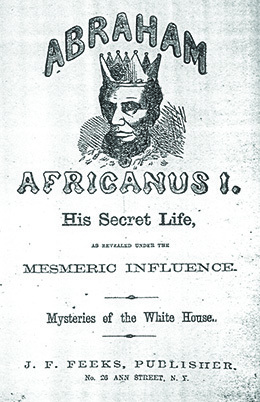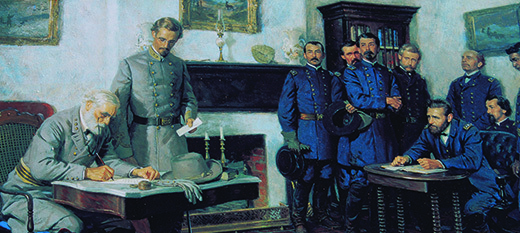| << Chapter < Page | Chapter >> Page > |
Despite the military successes for the Union army in 1863, in 1864, Lincoln’s status among many Northern voters plummeted. Citing the suspension of the writ of habeas corpus, many saw him as a dictator, bent on grabbing power while senselessly and uncaringly drafting more young men into combat. Arguably, his greatest liability, however, was the Emancipation Proclamation and the enlistment of African American soldiers. Many whites in the North found this deeply offensive, since they still believed in racial inequality. The 1863 New York City Draft Riots illustrated the depth of white anger.
Northern Democrats railed against Lincoln and the war. Republicans labeled these vocal opponents of the President Copperheads , a term that many antiwar Democrats accepted. As the anti-Lincoln poster below illustrates, his enemies tried to paint him as an untrustworthy and suspect leader ( [link] ). It seemed to most in the North that the Democratic candidate, General George B. McClellan, who did not support abolition and was replaced with another commander by Lincoln, would win the election.

The Republican Party also split over the issue of reelecting Lincoln. Those who found him timid and indecisive, and favored extending full rights to African Americans, as well as completely refashioning the South after its defeat, earned the name Radicals. A moderate faction of Republicans opposed the Radicals. For his part, Lincoln did not align himself with either group.
The tide of the election campaign turned in favor of Lincoln, however, in the fall of 1864. Above all else, Union victories, including the fall of Atlanta in September and General Philip Sheridan’s successes in the Shenandoah Valley of Virginia, bolstered Lincoln’s popularity and his reelection bid. In November 1864, despite earlier forecasts to the contrary, Lincoln was reelected. Lincoln won all but three states—New Jersey and the border states of Delaware and Kentucky. To the chagrin of his opponent, McClellan, even Union army troops voted overwhelmingly for the incumbent President.
By the spring of 1865, it had become clear to both sides that the Confederacy could not last much longer. Most of its major cities, ports, and industrial centers—Atlanta, Savannah, Charleston, Columbia, Mobile, New Orleans, and Memphis—had been captured. In April 1865, Lee had abandoned both Petersburg and Richmond. His goal in doing so was to unite his depleted army with Confederate forces commanded by General Johnston. Grant effectively cut him off. On April 9, 1865, Lee surrendered to Grant at Appomattox Court House in Virginia ( [link] ). By that time, he had fewer than 35,000 soldiers, while Grant had some 100,000. Meanwhile, Sherman’s army proceeded to North Carolina, where General Johnston surrendered on April 19, 1865. The Civil War had come to an end. The war had cost the lives of more than 600,000 soldiers. Many more had been wounded. Thousands of women were left widowed. Children were left without fathers, and many parents were deprived of a source of support in their old age. In some areas, where local volunteer units had marched off to battle, never to return, an entire generation of young women was left without marriage partners. Millions of dollars’ worth of property had been destroyed, and towns and cities were laid to waste. With the conflict finally over, the very difficult work of reconciling North and South and reestablishing the United States lay ahead.

Having failed to win the support it expected from either Great Britain or France, the Confederacy faced a long war with limited resources and no allies. Lincoln won reelection in 1864, and continued to pursue the Union campaign, not only in the east and west, but also with a drive into the South under the leadership of General Sherman, whose March to the Sea through Georgia destroyed everything in its path. Cut off and outnumbered, Confederate general Lee surrendered to Union general Grant on April 9 at Appomattox Court House in Virginia. Within days of Lee’s surrender, Confederate troops had lay down their arms, and the devastating war came to a close.

Notification Switch
Would you like to follow the 'U.s. history' conversation and receive update notifications?